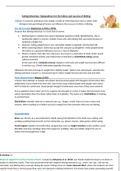Eating behaviour: Explanations for the failure and success of dieting
Dieting: A conscious attempt to lose weight, usually by restricting how much is eaten. Both
biological and psychological factors can influence the success or failure of dieting.
The spiral model-Heatherton & Polivy (1992)
Propose that dieting behaviour is a chain link of events.
Dieting begins in adolescence when individuals experience body dissatisfaction, this is
significantly higher in women. Initially, those who start dieting feel successful because of
temporary weight loss.
However, lasting weight loss is rare, eventually weight is regained, and the diet fails.
When assessing failure: Some may accept this and give up altogether. Many people blame
the failure to a personal deficiency such as a ‘lack of willpower’.
Dieters continue their diet from this point, but result in a restriction of food, which causes
greater emotional distress and makes them vulnerable to disinhibited eating (eating
without restraint)
At the same time, metabolic process changes in the body and weight loss becomes difficult
to achieve e.g., Ghrelin (stimulates appetite) increases.
Ultimately the lack of change in weight from ‘dieting harder’ leads to low self-esteem, whereby the
dieting individual is stuck in a ‘downward spiral’ where weight less becomes less and less likely.
Ironic process theory Wegner (1994)
A theory that attempts to explain why dieters become preoccupied with thoughts of food when they
deliberately restrict them from their diet. Stems from study where people were people were asked
NOT to think of a white bear, found people thought of white bear more than if they were asked to.
This is applied to food, when we try to suppress the thought of a food, it makes the food seem more
salient (desirable) when the dieter labels them as forbidden. This leads us to disinhibition of wanting
to eat that food.
Disinhibitors whether internal or external cues e.g., images, smells, lead us to lose control and
overeat, often resulting in no better success in weight loss than someone who was not dieting.
Successful diets
Boon says the key to a successful diet is detail, paying full attention to the food one is eating, and
avoiding anything that prevents us from doing this e.g., phone screens, video games whilst eating.
Social support explains successful diets, programmes such as weight watchers create positive social
identities and have meetings where this support is available, they set realistic targets for one to
follow and encouragement is high.
Evaluation +/-
Research support for ironic processes theory: A study by Adriaanse et al. (2011) saw female students trying to cut down on
intake of unhealthy snacks. They were presented with diet negative dieting intentions e.g., ‘when I am sad, I will not eat
chocolate’ and dieting diary was kept during the week. Findings show an ‘ironic rebound effect’ where the students ate more
calorific foods than a control group (that were not exposed to dieting intentions). This shows how simply associating yourself





